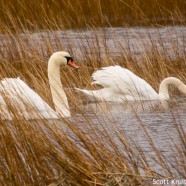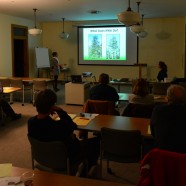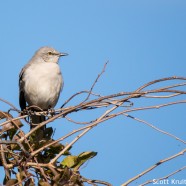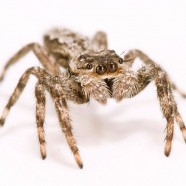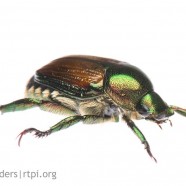Mute Swans (Cygnus olor)
If you live in the Chautauqua-Allegheny region of Western New York you are far more accustomed to spotting Tundra Swans rather than these Mute Swans (Cygnus olor), a beautiful species that likely takes the title for most attractive non-native invasive bird in North America. Mute Swans call Eurasia their homeland but were brought to North America by humans and have taken up residence in a number of areas since the late 19th century, especially those in the east and near suburban areas and cities. They are a threat to native waterfowl because of how aggressive they are, a behavior I can attest...
Read MoreThanks Attendees! Collaborative Forest Pest Project Information Session
A big “thank you!” to everyone who attended our Collaborative Forest Pest Project Information Session this past Thursday night at the Roger Tory Peterson Institute of Natural History in Jamestown, New York. Here you can see RTPI Conservation Technician Elyse Henshaw who did a terrific job educating over 20 members of the public on devastating forest pests like Hemlock Woolly Adelgid (HWA), an aphid-like insect targeting Eastern Hemlock trees, and Emerald Ash Borer (EAB), a wood boring insect targeting all of our Ash trees. As these pests threaten Chautauqua County organizations...
Read MoreNorthern Mockingbird (Mimus polyglottos)
Depending on where you live the Northern Mockingbird (Mimus polyglottos) may be an uncommon to rare species or a typical neighborhood pest. They have been advancing north in the past several decades, possibly because of development and more favorable habitats and likely thanks to climate change. They are still a scarce bird in the Chautauqua-Allegheny region likely for both of those reasons. Why the pest, you ask? One day, if you’re fortunate, you may wake up to a car alarm going off all night long outside your window…except it’s a bird doing a perfect imitation and it will...
Read MoreHelpful jumping spider
This jumping spider seems like it is ready to pounce! And look at those eyes…they are not targeting you, though. Let’s thank it for being so helpful and grabbing all the flying insects we do not want in our homes that are far more likely to bite us.
Read MoreJapanese Beetle (Popillio japonica)
This week is invasive species awareness week. There are plenty species to highlight in just one short week, but here’s one that seems to be particularly prevalent this time of year. The Japanese Beetle (Popillio japonica) is easily recognized by the characteristic rows of pale hairs on its abdomen and can be found in dense concentrations on a variety of fruit-bearing plants. Anyone growing blueberries, raspberries or blackberries can attest to how much damage they can do in a short period of time, if left unchecked!
Read More



